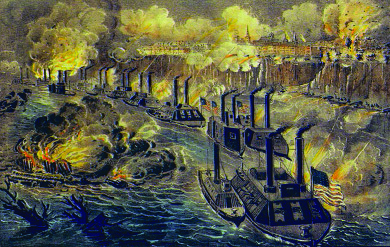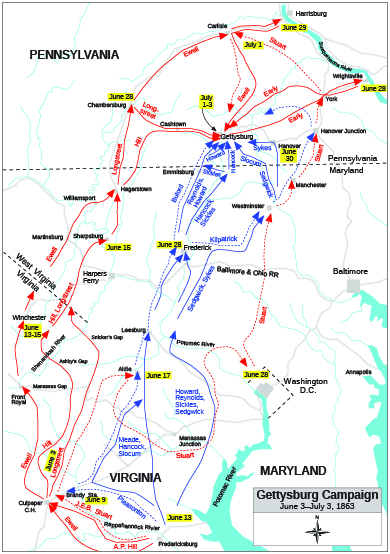| << Chapter < Page | Chapter >> Page > |

As Grant and his forces pounded Vicksburg, Confederate strategists, at the urging of General Lee, who had defeated a larger Union army at Chancellorsville, Virginia, in May 1863, decided on a bold plan to invade the North. Leaders hoped this invasion would force the Union to send troops engaged in the Vicksburg campaign east, thus weakening their power over the Mississippi. Further, they hoped the aggressive action of pushing north would weaken the Union’s resolve to fight. Lee also hoped that a significant Confederate victory in the North would convince Great Britain and France to extend support to Jefferson Davis’s government and encourage the North to negotiate peace.
Beginning in June 1863, General Lee began to move the Army of Northern Virginia north through Maryland. The Union army—the Army of the Potomac—traveled east to end up alongside the Confederate forces. The two armies met at Gettysburg, Pennsylvania, where Confederate forces had gone to secure supplies. The resulting battle lasted three days, July 1–3 ( [link] ) and remains the biggest and costliest battle ever fought in North America. The climax of the Battle of Gettysburg occurred on the third day. In the morning, after a fight lasting several hours, Union forces fought back a Confederate attack on Culp’s Hill, one of the Union’s defensive positions. To regain a perceived advantage and secure victory, Lee ordered a frontal assault, known as Pickett’s Charge (for Confederate general George Pickett), against the center of the Union lines on Cemetery Ridge. Approximately fifteen thousand Confederate soldiers took part, and more than half lost their lives, as they advanced nearly a mile across an open field to attack the entrenched Union forces. In all, more than a third of the Army of Northern Virginia had been lost, and on the evening of July 4, Lee and his men slipped away in the rain. General George Meade did not pursue them. Both sides suffered staggering losses. Total casualties numbered around twenty-three thousand for the Union and some twenty-eight thousand among the Confederates. With its defeats at Gettysburg and Vicksburg, both on the same day, the Confederacy lost its momentum. The tide had turned in favor of the Union in both the east and the west.

Following the Battle of Gettysburg, the bodies of those who had fallen were hastily buried. Attorney David Wills, a resident of Gettysburg, campaigned for the creation of a national cemetery on the site of the battlefield, and the governor of Pennsylvania tasked him with creating it. President Lincoln was invited to attend the cemetery’s dedication. After the featured orator had delivered a two-hour speech, Lincoln addressed the crowd for several minutes. In his speech, known as the Gettysburg Address , which he had finished writing while a guest in David Wills’ home the day before the dedication, Lincoln invoked the Founding Fathers and the spirit of the American Revolution. The Union soldiers who had died at Gettysburg, he proclaimed, had died not only to preserve the Union, but also to guarantee freedom and equality for all.
Several months after the battle at Gettysburg, Lincoln traveled to Pennsylvania and, speaking to an audience at the dedication of the new Soldiers’ National Ceremony near the site of the battle, he delivered his now-famous Gettysburg Address to commemorate the turning point of the war and the soldiers whose sacrifices had made it possible. The two-minute speech was politely received at the time, although press reactions split along party lines. Upon receiving a letter of congratulations from Massachusetts politician and orator William Everett, whose speech at the ceremony had lasted for two hours, Lincoln said he was glad to know that his brief address, now virtually immortal, was not “a total failure.”
Four score and seven years ago our fathers brought forth on this continent, a new nation, conceived in Liberty, and dedicated to the proposition that all men are created equal.
Now we are engaged in a great civil war, testing whether that nation, or any nation so conceived and so dedicated, can long endure. We are met on a great battle-field of that war. We have come to dedicate a portion of that field, as a final resting place for those who here gave their lives that that nation might live. It is altogether fitting and proper that we should do this.
It is for us the living . . . to be here dedicated to the great task remaining before us—that from these honored dead we take increased devotion to that cause for which they gave the last full measure of devotion—that we here highly resolve that these dead shall not have died in vain—that this nation, under God, shall have a new birth of freedom—and that government of the people, by the people, for the people, shall not perish from the earth.
—Abraham Lincoln, Gettysburg Address, November 19, 1863
What did Lincoln mean by “a new birth of freedom”? What did he mean when he said “a government of the people, by the people, for the people, shall not perish from the earth”?
Acclaimed filmmaker Ken Burns has created a documentary about a small boys’ school in Vermont where students memorize the Gettysburg Address. It explores the value the address has in these boys’ lives, and why the words still matter.
The year 1863 proved decisive in the Civil War for two major reasons. First, the Union transformed the purpose of the struggle from restoring the Union to ending slavery. While Lincoln’s Emancipation Proclamation actually succeeded in freeing few slaves, it made freedom for African Americans a cause of the Union. Second, the tide increasingly turned against the Confederacy. The success of the Vicksburg Campaign had given the Union control of the Mississippi River, and Lee’s defeat at Gettysburg had ended the attempted Confederate invasion of the North.

Notification Switch
Would you like to follow the 'U.s. history' conversation and receive update notifications?